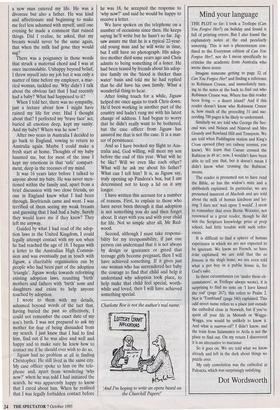Mind your language
THE PLOT so far: I took a Trollope (Can You Forgive Her?) on holiday and found it full of printing errors. But I also found the explanatory notes at the end peculiarly annoying. This is not a phenomenon con- fined to the Everyman edition of Can You Forgive Her?, nor do I mean specifically to criticise the academic from Australia who wrote these notes.
Imagine someone getting to page 32 of Can You Forgive Her? and finding a reference to Robinson Crusoe, and immediately turn- ing to the notes at the back to find out who Robinson Crusoe was. Where has this reader been living — a desert island? And if this reader doesn't know who Robinson Crusoe is, how much of the preceding 31 and suc- ceeding 700 pages is he likely to understand.
Similarly we are told who George the Sec- ond was, and Nelson and Nimrod and Mrs Grundy and Rowland Hill and Tennyson. We are told when Paddington station and King's Cross opened (they are railway termini, you know). We learn that Caesar crossed the Rubicon in 49 BC; now, I wouldn't have been able to tell you that, but it doesn't mean I didn't know what 'crossing the Rubicon' means.
The reader is presumed not to have read the Bible, so has the widow's mite and a shibboleth explained. In particular, we are presumed innocent of Macbeth and are told about the milk of human kindness and let- ting 'I dare not' wait upon 'I would'. I seem to remember that even Bertie Wooster, not renowned as a great reader, though he did win the Scripture knowledge prize at prep school, had little trouble with such refer- ences.
It is difficult to find a sphere of human experience in which we are not expected to be ignorant. We know no French, so have éclat explained; we are told that the os femoris is the thigh bone; we are even told what a pot boy in a public house is, for God's sake.
In these circumstances (or 'under these cir- cumstances', as Trollope always wrote), it is surprising to find no note on 'I have kissed the rod' (page 267); this refers to Psalm 2. Nor is `Tombland' (page 340) explained. This odd street name refers to a place just outside the cathedral close in Norwich, but if you've spent all your life in Monash or Wagga- Wagga, you would be unlikely to know it. And what is marrow-oil? I didn't know, and the train from Salamanca to Avila is not the place to find out. On my return I discovered it is an alternative to macassar.
So it goes on. We are told what we know already and left in the dark about things we puzzle over.
My only consolation was the cathedral at Palencia, which was surprisingly satisfying.
Dot Wordsworth










































































 Previous page
Previous page